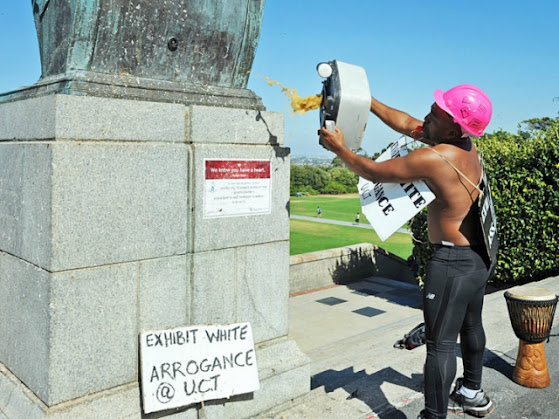Having explored the colonial legacies which continue to permeate the WASH sector, and intra-urban sanitation inequalities. Let’s look towards the case of Cape Town, South Africa, to explore how these legacies interact, and manifest in struggles for urban belonging and egalitarian citizenship.
 |
| Figure 1. Image of Chumani Maxwele throwing contents of porta-loo, onto the statue of Cecil John Rhodes, on UTC campus. Source: IOL News. |
‘We want white people to know how we live. We live in poo. I am from a poor family…I have to give Cecil John Rhodes a poo shower and whites will have to see it’
This quote was said by Chumani Maxwele, a student of the University of Cape Town (UTC) on March 12, 2015, after he flung the human waste contained within a porta-loo, onto the statue of British imperialist, Cecil John Rhodes on UTC’s campus. This is just one example of the tactics of spectacle, that have been employed as part of the ‘poo protests’ in Cape Town since 2011 (MacFarlane, 2017) .
So, what triggered the Poo Protests? The poo protests manifested as a demand from slum dwellers to be provided with modern flush toilets, and the associated rights of privacy and dignity, rather than the portable flush toilets (PTF) the government provided (Robins, 2014). The protesters employed a ‘cultural poolitics of disgust and contamination’ to contaminate the hyper-sanitized spaces of the elite, and awaken the authorities to the reality of the faeces-filled living conditions in the urban peripheries, as exemplified by the quote, and shown in the video below (MacFarlane, 2017).
What does sanitation have to do with citizenship? As demonstrated by the debate; the toilet has become a domain of struggle, in which are range of political concerns surrounding questions of gender, race, citizenship, and urban social justice, become visible (MacFarlane, 2017). If we consider Michael Rubenstein’s (2010) developmental order of democracy, it’s clear that in Cape Town, modernisation and democratisation have moved in radically separate trajectories, due to the Sanitation Syndrome, and the consequent racialisation of infrastructure provisioning during apartheid (discussed previously). This racialisation persists as less than 2% of the water and sanitation capital budget is allocated to slums, whereas, vast amounts are spent on maintaining services in wealthier, white neighbourhoods (MacFarlane, 2017). This is partly due to the fact that slums, and associated sanitation solutions continue to be treated as temporary, as exemplified by the provision of PTFs, and explained by Phuzema Mlugwana, in the debate (09:15). As well as, a ‘chronic inability to find solutions’ due to a ‘lack of political will’ to consult slum dwellers, pointed out by Tony Ehrenreich in the video (13:24). Ultimately, until slum communities are provided with private, flush-toilets, citizenship will not be felt. Therefore, sanitation in Cape Town, is more than sanitation, it is a ‘resilient fulcrum along which rights to the city and civil society are both negotiated and denied’ (Jackson & Robins, 2018).
I really recommend watching the video in its entirety, as it provides a rare opportunity to hear, first-hand, the perspectives and experiences of slum dwellers themselves, and demonstrates how WASH sector interventions can actually serve to perpetuate forms of unequal citizenship, even if they seemingly improve access to sanitation. This really drives home the need for dialogue between stakeholders.
The debate also highlights different considerations that must be made when implementing sanitation solutions, such as gender, and the topography of slumscapes, which I be exploring in greater depth in the upcoming posts!
Brilliant post Juliana! You've given a really interesting take on citizenship in slums in Cape Town and how WASH access is differentiated along the lines or racial and economic inequalities. What do you think could be a solution to these issues?
ReplyDeleteHi Beatrice, thanks so much, I'm glad you found it interesting!
DeleteThat is a very difficult question to answer - I think the debate shows the different considerations which must be taken into account such as topography and gender. Clearly, the government of Cape Town must provide slum dwellers with improved sanitation - but I think the issue lies in the demand for flush toilets, which we really should be moving away from if we are to adapt, and mitigate climate change. If accepted by the community, I think an EcoSan system could be a great option (Here's the link if you'd like to read more about this: https://water-sanitation-africa.blogspot.com/2020/11/poolitical-cities-sanitation.html). But this is an issue which I will definitely be looking into more, and hopefully seeing some positive news out of Cape Town soon!